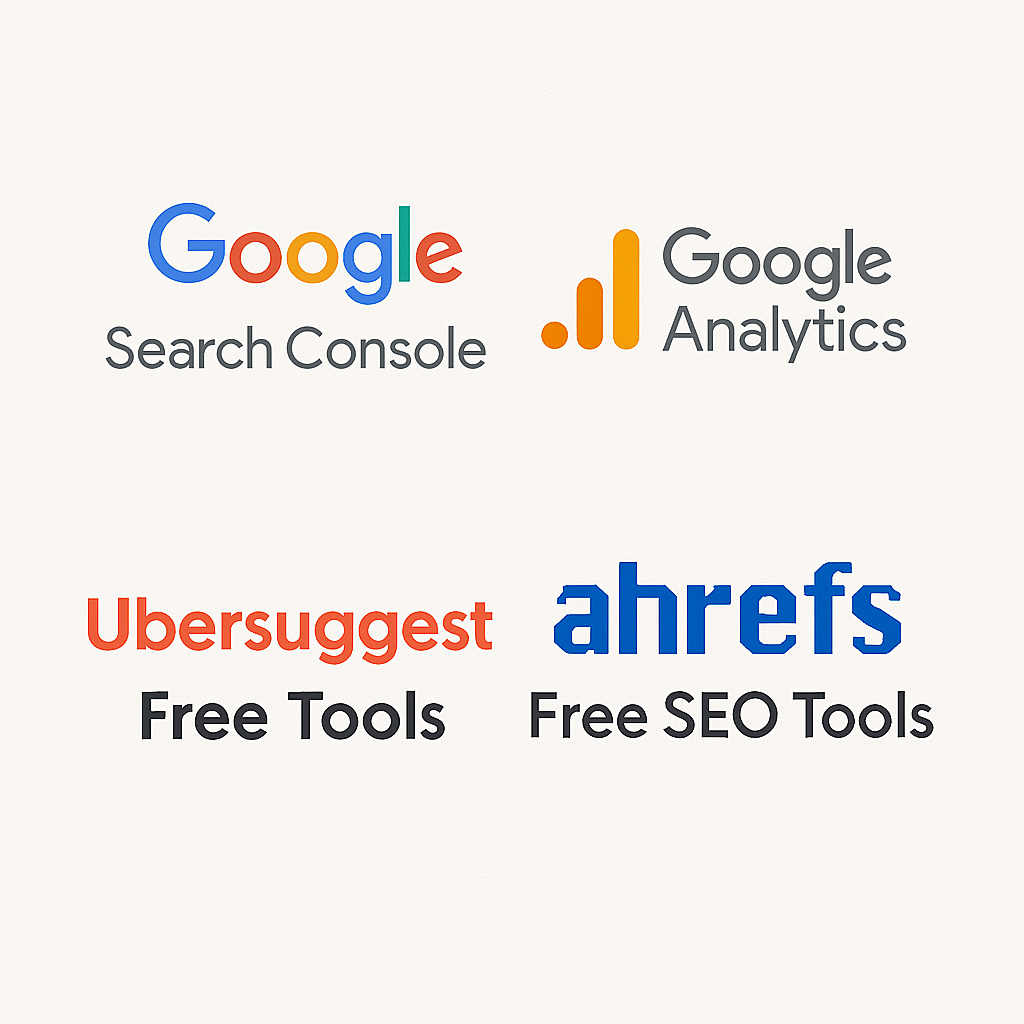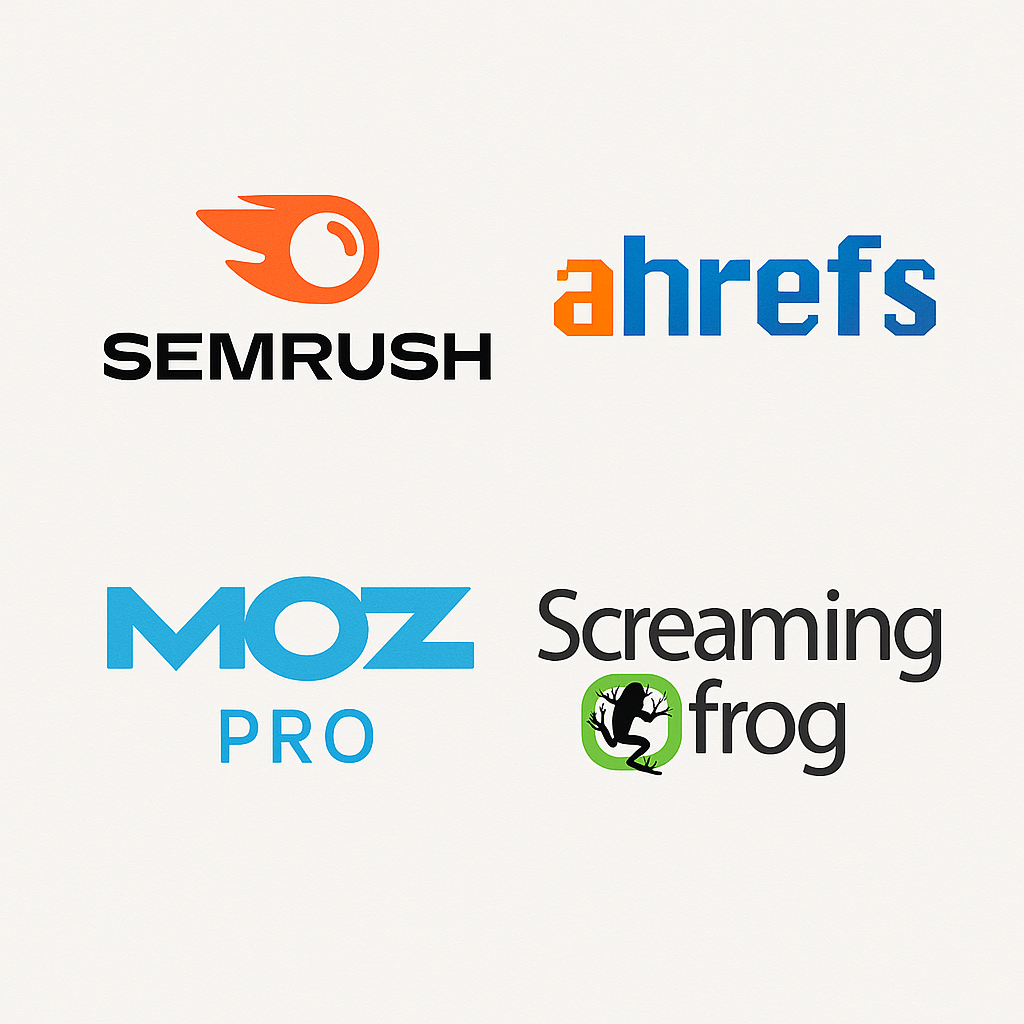If you’ve ever tried to grow a website without the right data, you know how frustrating it can be. You publish content, update your design, maybe even build a few backlinks, but you’re never sure what’s actually working. That’s where SEO tools come in.
Think of them as the instruments on a car dashboard. They don’t drive the car for you, but they show you how fast you’re going, how much fuel you have, and whether something under the hood needs attention.
SEO tools are software and platforms that track how healthy your site is, how visible you are on Google, and where you stand compared to your competitors. For example:
- Google Search Console helps you see whether your site is properly indexed and which search queries drive traffic.
- Semrush and Ahrefs dig deeper, showing everything from backlink profiles to keyword gaps where your competitors are ranking but you’re not.
- Screaming Frog, a crawler, scans your site page by page to catch technical errors like broken links or duplicate meta descriptions.
At Pella Global, we use these tools daily to help businesses achieve strong search visibility.
Why Use SEO Tools?
Let’s be real, guesswork doesn’t work in digital marketing. Without tools, you’re flying blind. SEO tools give you a roadmap.
- Clarity: They show exactly where your traffic comes from and which pages pull the most weight.
- Efficiency: Imagine scanning 500 pages by hand for errors—it would take days. Tools do it in minutes.
- Strategy: By analyzing competitors, you uncover opportunities they’re capitalizing on that you’re missing.
- Risk Management: Google updates can shake up rankings overnight. Tools help you quickly figure out what went wrong and how to adapt.
The Business Benefits of SEO Tools
It’s easy to think of SEO tools as just “rank trackers,” but their impact goes far beyond search positions.
- Budget Efficiency: Why rely only on paid ads when SEO tools help you build sustainable organic traffic that keeps paying dividends?
- Better User Experience: Tools reveal slow-loading pages, poor mobile design, or confusing navigation that frustrates users.
- Revenue Growth: By spotlighting your highest-converting pages, tools help you double down on what drives sales.
- Local Advantage: SEO tools also identify local opportunities, like ranking for searches such as “SEO agency in New York” or “digital marketing agency in London.”
Common Mistakes Businesses Make with SEO Tools
While SEO tools are powerful, many businesses fall into the trap of misusing them. One of the biggest mistakes is focusing only on vanity metrics—like traffic volume—while ignoring conversions and actual business results. Getting 10,000 visits means little if those visitors don’t become leads or customers.
Another common error is investing in expensive tools without knowing how to use them. Tools like Semrush or Moz Pro are fantastic, but without the right expertise, businesses barely scratch the surface of their capabilities.
Then there’s over-optimization, where companies blindly follow tool recommendations, stuffing keywords, rewriting content too often, or making unnecessary technical changes that harm instead of help.
At Pella Global, we help businesses avoid these pitfalls. Our team translates raw tool data into clear, actionable Seo Services. Instead of chasing empty numbers, we focus on metrics that matter, visibility, trust, conversions, and revenue growth. With us, tools stop being confusing dashboards and become real growth engines.
How AI is Changing SEO Tools
Artificial intelligence has already started reshaping the way SEO tools work, and 2025 is only making this trend stronger. Platforms like Semrush now offer AI writing assistants that suggest optimized headlines and content improvements, while Ahrefs uses AI-powered insights to predict which keywords will drive the most impact.
What does this mean for businesses? It means SEO tools are becoming not just reactive, but predictive. Instead of only analyzing what has already happened, AI-driven tools can forecast trends, highlight future opportunities, and even automate parts of the optimization process.
The Best Free SEO Tools

You don’t need a huge budget to start optimizing. Even free tools can provide a ton of value.
- Google Search Console: The backbone of any SEO strategy. It shows indexing issues, click-through rates, and even highlights mobile usability problems.
- Google Analytics: Still one of the best ways to track how visitors behave on your site, from where they came from to what made them leave.
- Ubersuggest: Great for keyword ideas and quick competitor snapshots—especially helpful for small businesses just starting out.
- Ahrefs Free Tools: Lets you peek at backlinks and explore keyword rankings without paying for the full suite.
Paid and Advanced SEO Tools

As businesses grow, so does the competition. That’s when advanced, paid tools become essential.
- Semrush: A true all-in-one platform. From keyword analysis and competitor tracking to PPC insights and full site audits, it covers almost everything.
- Ahrefs: Famous for backlink analysis, but also excellent for keyword research and identifying content gaps.
- Moz Pro: Known for its Domain Authority metric, it’s also a reliable option for site audits and keyword difficulty analysis.
- Screaming Frog: An absolute must for technical SEO, catching issues that would otherwise fly under the radar.
Specialized SEO Tools
Different goals require different tools. Here’s how they break down:
- On-Page SEO Tools: Yoast SEO, Rank Math, Moz On-Page Grader (help with readability, keyword use, and metadata).
- Technical SEO Tools: Google PageSpeed Insights, GTMetrix, and Screaming Frog (analyze speed, mobile usability, and technical health).
- Backlink Checkers: Ahrefs, Majestic SEO, SEMrush (map your backlink profile and spot opportunities).
- Keyword Research Tools: Google Keyword Planner, AnswerThePublic, SEMrush (identify what your audience is searching for).
- SEO Audit Tools: SEMrush Site Audit, Ahrefs Site Audit, Moz Pro (big-picture evaluations of site performance).
Measuring SEO Success
Here’s the truth: launching an SEO strategy is just the beginning. You need to track whether your efforts are paying off.
- Keyword Rankings: Tools like SEMrush Position Tracking show if you’re moving up in the results.
- Traffic and Engagement: Google Analytics and Data Studio let you see how visitors behave once they land on your site.
- Backlink Growth: SEMrush Backlink Analytics and Moz Link Explorer show whether your authority is increasing.
- Site Health: Technical crawlers like Screaming Frog ensure issues don’t drag your site down.
A Real-World Example
Let’s imagine you own a small online clothing store. Using Google Search Console, you discover that one product page gets thousands of impressions but very few clicks. With Semrush, you realize the page’s title is too generic compared to competitors. You tweak the title, add richer descriptions, and suddenly, your clicks double.
Now imagine adding Ahrefs into the mix. You discover blogs linking to competitor products but not yours. You reach out, share your story, and secure new backlinks. The result? Not just more clicks, but higher trust and stronger sales. That’s the real power of using SEO tools together, they turn small adjustments into long-term wins.
To Sum Up
SEO tools go beyond solving issues, they open the door to new opportunities. Whether you rely on free platforms like Google Search Console or invest in advanced suites such as Semrush and Ahrefs, these tools provide the visibility and clarity every business needs to grow. Free tools give small businesses a strong starting point, while advanced options are essential for larger enterprises competing in demanding industries.
At Pella Global 360° Digital Marketing Agency, we take these insights and turn them into strategies that boost rankings, improve user experience, and drive measurable growth.